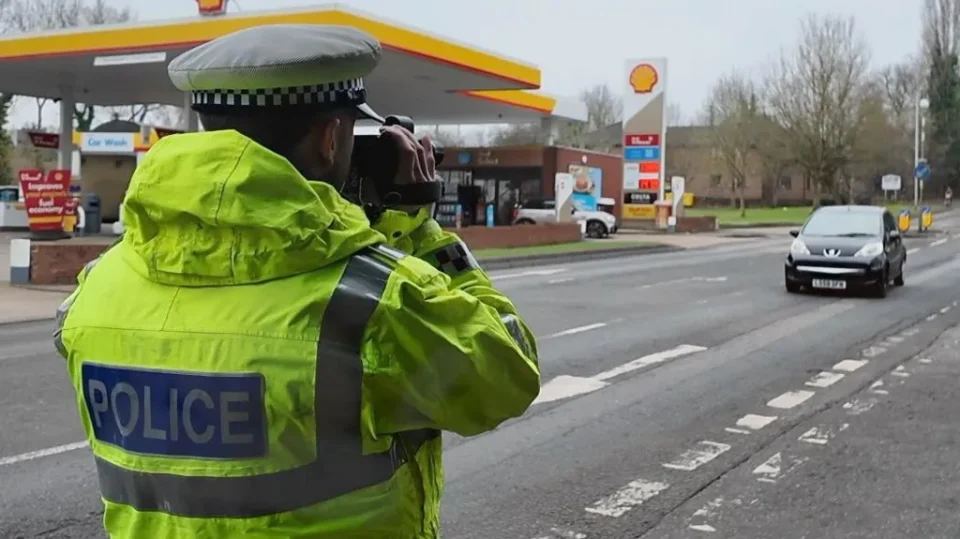Motorists have been detected reaching speeds of 164 mph (264 km/h) on UK roads, prompting police to issue a stern warning about the dangers of reckless driving, emphasizing that excessive speed can be fatal.
Data from law enforcement indicates that over 24,000 vehicles were captured on camera traveling faster than 100 mph (161 km/h) from 2019 to 2023.
In particular, two vehicles—one on the M25 in Kent and another in Greater Manchester—were recorded at 164 mph (264 km/h), while cars in London and the Humberside area were clocked at 163 mph (262 km/h).
Ch Insp Craig West, who leads roads policing at Kent Police, highlighted that the aftermath of high-speed collisions can be “devastating for families and friends.”
The BBC submitted freedom of information requests to various police forces to gather data on the highest speeds recorded over a five-year span.
Out of the 45 forces approached, 27 were able to provide relevant information.
Greater Manchester Police reported that a driver caught at 164 mph (264 km/h) on the M62 in 2023 was operating a cloned registration plate.
Kent Police also stated that they could not trace the driver of a Seat Leon traveling at the same speed on the M25 in Swanley in 2022.
In both instances, these speeds were over twice the motorway limit of 70 mph (113 km/h).
In another case, a Porsche driver was banned for six months after being recorded at 163 mph (262 km/h) on the M1 in north London at the onset of the Covid-19 pandemic. A driver in Humberside caught at the same speed received a four-month disqualification and a £950 fine.
In 2019, South Yorkshire Police issued a driver caught at 162 mph (260 km/h) six penalty points on their license along with fines totaling £1,210.
Ch Insp Craig West stressed, “Speed does kill. It’s crucial that individuals slow down and refrain from driving at the maximum speed limit.”
He told the BBC, “The repercussions for the families and friends of the victims, as well as the responding officers, are profound. The impact lingers, making it essential to relay this message to the small group of inconsiderate drivers who persist in speeding.”
Jillie Slope from West Sussex is advocating for stricter enforcement following the tragic death of her son, Callum Chapman, who was a passenger in a car that crashed into trees on the A24 near Southwater in December 2020, traveling at speeds of up to 103 mph.
“The driver escaped with minor injuries, but Callum didn’t stand a chance. It’s devastated me,” she shared. “It feels like his death has meant nothing, as nothing has changed; speeding still continues unabated.”
“We need more police presence, better camera coverage, and enhanced technology in vehicles—something has to be done,” Ms. Slope asserted.
The driver was convicted of causing death by dangerous driving and sentenced to three years in prison, alongside a four-and-a-half-year driving ban. The court learned that he had been racing another vehicle.
That other driver admitted to dangerous driving and received a six-month prison sentence and a 21-month driving disqualification.
According to 2023 statistics from the Department for Transport, 314 individuals lost their lives in road accidents in which speeding was a contributing factor, marking a high not seen in ten years.
Jo Shiner, Chief Constable of Sussex Police and roads policing lead for the National Police Chiefs Council, remarked that every loss is “one too many.”
“Nearly 3,000 individuals are killed or seriously injured on our roads annually due to speeding,” Ms. Shiner added. “For each of these individuals, countless friends, family members, and communities feel the repercussions, making it hard to fully quantify the extent of the impact.”
“Exceeding the speed limit is a deliberate choice,” she pointed out.
The Sentencing Council specifies that the maximum penalty for speeding is £1,000, increasing to £2,500 for offenses on the motorway.
David Sonn, a traffic lawyer who has defended a driver clocked at 163 mph, notes that those exceeding 100 mph risk disqualification. “If there are no aggravating circumstances and a mostly clean record, slightly over 100 mph might avoid disqualification,” he explained.
A ban becomes “nearly certain” for those caught over 110 mph, depending on the situation, and could even lead to charges for dangerous driving, which may incur a prison sentence of up to two years, alongside a mandatory driving ban of at least one year that necessitates passing an extended driving test before resuming driving.
Shaun Helman, chief scientist for behavioral sciences at the Transport Research Laboratory, stated, “Many modern vehicles come equipped with intelligent speed assistance technology, which can alert drivers when they exceed the speed limit and, in some cases, gradually slow the vehicle down to comply.”
Mike Hawes, CEO of the Society of Motor Manufacturers and Traders, added that eight out of ten new cars feature driver assistance systems like advanced emergency braking, which have resulted in a 38% decrease in rear-end collisions.
“Ultimately, however, responsible driving remains critical; while technology can reduce accident risks, human error is still the leading cause of most crashes,” he emphasized.
A spokesperson from the Department for Transport stated, “There are no justifications for risking others’ lives through speeding. We continue to evaluate how motorists can take advantage of the latest technology to ensure safer, more reliable journeys while also minimizing emissions.”


